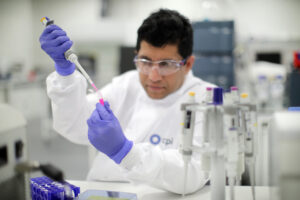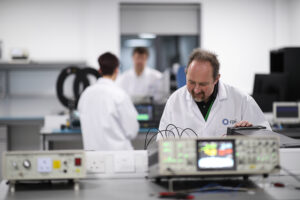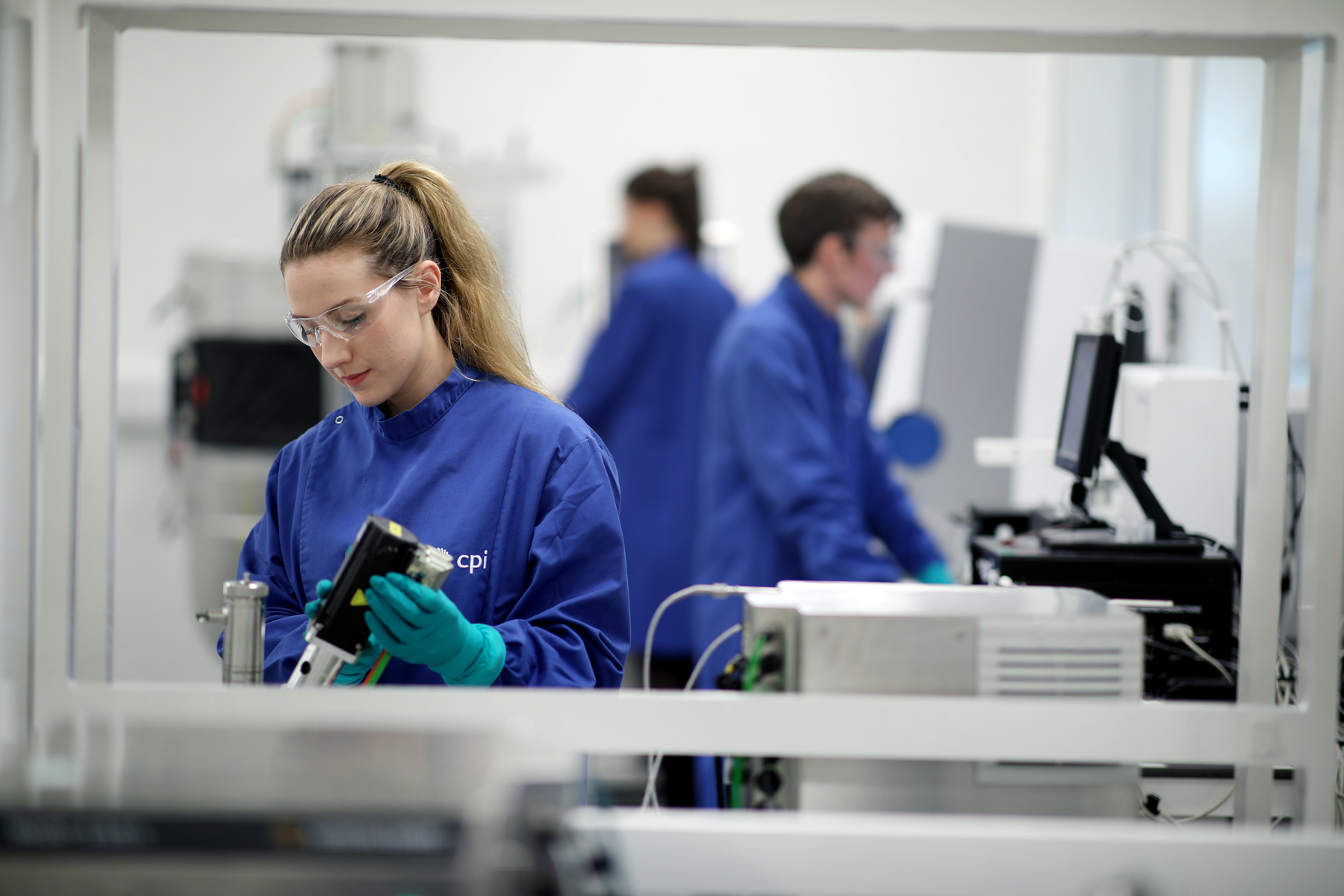We sat down with Sophie Walton, Director of Strategic Partnerships, and Chris Barclay, Strategic Partnerships Manager for the North East, to talk about CPI’s recent move into The Catalyst, Newcastle Helix and how they can support the commercialisation of deep tech innovations that solve healthcare and sustainability challenges.
About CPI
CPI is an independent deep tech innovation organisation, and part of the Catapult Network, a national network of technology and innovation centres that support businesses to transform great ideas into valuable products and services.
We work with all sorts of different companies – spinouts, start-ups, scale ups, and big multinationals. We also work with the rest of the ecosystem – universities, researchers, investors, and other RTOs – to try to provide the best and most holistic support we can to businesses. Fundamentally, we help get processes and products to market quicker, by applying our expertise, technology, infrastructure, and fostering partnerships that connect the dots through the innovation ecosystem.
We’ve got a wide range of scale up capabilities in various disciplines. This is everything from biologics and biotechnology to formulated products to electronics. Predominately, the innovations we develop will support health, such as complex medicines, pharmaceutical manufacturing or health technologies, or the sustainability and environmental agenda, such as battery technology, materials recycling and developing novel sustainable food.
We are a not-for-profit company, limited by guarantee, so all the profits we make are reinvested so we can help more companies and people innovate and grow.
These sentiments are probably best articulated by CPI’s vision, which is to create a healthier society, a cleaner environment, and a vibrant UK economy, by making sure that every great invention has the best chance of becoming a commercially marketable product.
Why did you open an office in The Catalyst?
 It’s a glamourous building, so it’s lovely to work here for a start, and we’re a North-East based business, so we’ve always been very active in the region.
It’s a glamourous building, so it’s lovely to work here for a start, and we’re a North-East based business, so we’ve always been very active in the region.
The RDA (Regional Development Agency) originally set up CPI and the expectation was that we would support regeneration in the North East—which we have absolutely contributed to. However, most of our offices to date have been a bit more south, in Teesside and in County Durham, so we felt like we were missing a physical presence in Newcastle and the North of Tyne.
The Catalyst is perfect because it hosts two really critical national centres of excellence – the National Innovation Centre for Ageing (NICA) and the National Innovation Centre for Data (NICD) – both of which we actively engage. Opening an office in The Catalyst allows us to be closer to these two partners, to the wider university, and to the vibrant ecosystem that is developing at a pace up here. This means we can start to help more companies in the North-East, particularly Newcastle and the North of Tyne.
Opening this office is also part of our wider regional strategy to become more embedded and physically present in areas that are well aligned with our own capabilities, and which share our ambitions for growth and impact.
We’re a national organisation, but we’re conscious each region has its own research and innovation ecosystem and goals, so we’ve recently thought a lot about how best to use our national capabilities more intentionally within specific regional ecosystems. That’s one of the reasons that we’re up in Newcastle – to become more embedded with the start-up and spin out communities here, as many life sciences and HealthTech companies are popping up across the city now.
We also have an academic engagement strategy, which looks to focus and create more impact from the interactions we have with universities. As part of this, we want to work more closely with Newcastle University, as it has outstanding capabilities. We have already partnered with them on many projects, such as the Internet of Caring Things programme with NICA.
In addition, we also want to work with the North of Tyne Combined Authority to support them in their plans to stimulate ambitious growth and job creation across the region. The research and innovation ecosystem plays a huge part to play within this, and we’re keen to be in the mix.
How does CPI aim to improve and reduce future challenges?
 There are so many challenges now facing society, and we’ve seen over recent years rapidly increasing volatility — there was Brexit, then COVID-19, and now it’s Russia/Ukraine and the fuel crisis. These are huge challenges nationally and globally, and we have to work to increase our resilience for the future and innovate at speed to help society through increasingly serious and complicated issues.
There are so many challenges now facing society, and we’ve seen over recent years rapidly increasing volatility — there was Brexit, then COVID-19, and now it’s Russia/Ukraine and the fuel crisis. These are huge challenges nationally and globally, and we have to work to increase our resilience for the future and innovate at speed to help society through increasingly serious and complicated issues.
One thing which will outstrip everything else if we are not careful is climate change – it’s going to trigger more global volatility and inequality, and we’re running out of time to address it. If we’re going to make a difference, it’s got to be now. One of the reasons I’m proud to work for CPI is that we’re working with companies developing amazing technologies that will help mitigate climate change – although we all need to act as individuals, too. It will be a combination of both the technologies we develop and changes in our own personal behaviours that can fix this – and I’m trying to work on both those points currently!
Skills are also important. If you look at the jobs of the next ten years and the challenges that we will have to overcome, then it’s crucial to prepare tomorrow’s workers with the right skills for the digital age, and to unlock the promises of digital manufacturing. CPI offers a variety of science and tech apprenticeships to make sure people in the region have the opportunity to develop their skills and take on fulfilling, high-value jobs.
Through working towards some of these things in locations like the Catalyst – and through the partnerships we believe we can build here – we think we can make a massively positive impact, which is what gets us out of bed in the morning at CPI!



